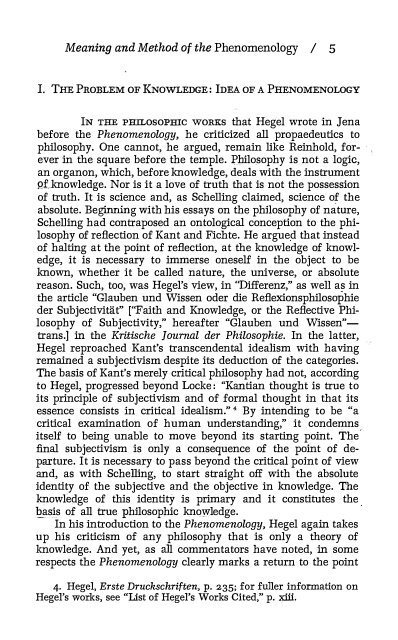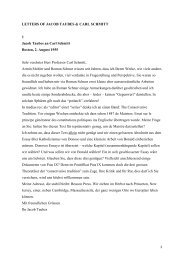selection one - Sound and Signifier
selection one - Sound and Signifier
selection one - Sound and Signifier
You also want an ePaper? Increase the reach of your titles
YUMPU automatically turns print PDFs into web optimized ePapers that Google loves.
Meaning <strong>and</strong> Method of the Phenomenology / 5<br />
1. THE PROBLEM OF KNOWLEDGE : IDEA OF A PHENOMENOLOGY<br />
IN THE PHILOSOpmC WORKS that Hegel wrote in Jena<br />
before the Phenomenology, he criticized all propaedeutics to<br />
philosophy. One cannot, he argued, remain like Reinhold, forever<br />
in the square before the temple. I>hilosophy is not a lOgiC,<br />
an organon, which, before knowledge, deals with the instrument<br />
Qtknowledge. Nor is it a love of truth that is not the possession<br />
of truth. It is science <strong>and</strong>, as Schelling claimed, science of the<br />
absolute. Beginning with his essays on the philosophy of nature,<br />
Schelling had contraposed an ontological conception to the philosophy<br />
of reflection of Kant <strong>and</strong> Fichte. He argued that instead<br />
of halting at the point of reflection, at the knowledge of knowledge,<br />
it is necessary to immerse <strong>one</strong>self in the object to be<br />
known, whether it be called nature, the universe, or absolute<br />
reason. Such, too, was Hegel's view, in "Differenz," as well as in<br />
the article "Glaub en und Wissen oder die Reflexionsphilosophie<br />
der Subjectivitat" ["Faith <strong>and</strong> Knowledge, or the Reflective Philosophy<br />
of Subjectivity," hereafter "Glaub en und Wissen"trans.]<br />
in the Kritische Journal der Philosophie. In the latter,<br />
Hegel reproached Kant's transcendental idealism with having<br />
remained a subjectivism despite its deduction of the categories.<br />
The basis of Kant's merely critical philosophy had not, according<br />
to Hegel, progressed beyond Locke: "Kantian thought is true to<br />
its principle of subjectivism <strong>and</strong> of formal thought in that its<br />
essence consists in critical idealism." 4 By intending to be "a<br />
critical examination of human underst<strong>and</strong>ing," it condemns<br />
itself to being unable to move beyond its starting point. The '<br />
final subjectivism is only a consequence of the point of departure.<br />
It is necessary to pass beyond the critical point of view<br />
<strong>and</strong>, as with Schelling, to start straight off with the absolute<br />
identity of the subjective <strong>and</strong> the objective in knowledge. The<br />
knowledge of this identity is primary <strong>and</strong> it constitutes the<br />
asis of all true philosophic knowledge.<br />
In his introduction to the Phenomenology, Hegel again takes<br />
up his criticism of any philosophy that is only a theory of<br />
knowledge. And yet, as all commentators have noted, in some<br />
respects the Phenomenology clearly marks a return to the point<br />
4. Hegel, Erste Druckschriften, p. 235; for fuller information on<br />
Hegel's works, see "List of Hegel's Works Cited," p. xiii.




